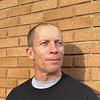Take a photo of a barcode or cover
I did a book report on [book: We], [book: 1984], and [book: Brave New World] in high school. Didn't everybody? I made my thesis something about love vs. sex. That is, as a leader of a dystopian society, in order to keep things going, you have to remove the former from the latter.
I don't remember a lot about this book specifically, except for the touchy and smelly movie theaters, and that everyone lived in glass buildings so that everybody could see everybody else. I do remember that I liked it a lot, though, and wanted it to be as well-known as 1984 and BNW, so that other people would enjoy it too.
I don't remember a lot about this book specifically, except for the touchy and smelly movie theaters, and that everyone lived in glass buildings so that everybody could see everybody else. I do remember that I liked it a lot, though, and wanted it to be as well-known as 1984 and BNW, so that other people would enjoy it too.
This is a book I appreciate, but not one I much enjoyed. From a reading standpoint, it's akin to a worse version of a medley of 1984 and Brave New World. The plotting and characters do not come to life in quite the same way.
There's also something to be said for the ways in which those other books grounded themselves. There was enough recognizable society in 1984 for that book to create a sense of unease or even fear. In Brave New World, there's enough clever science fiction that a reader could see society progressing in that direction if it were left unchecked. Here, there is exaggeration in service of an idea, but the resulting society is not one that feels believable.
There's also something to be said for the ways in which those other books grounded themselves. There was enough recognizable society in 1984 for that book to create a sense of unease or even fear. In Brave New World, there's enough clever science fiction that a reader could see society progressing in that direction if it were left unchecked. Here, there is exaggeration in service of an idea, but the resulting society is not one that feels believable.
adventurous
dark
mysterious
reflective
sad
tense
medium-paced
We is a political satire written by the Russian author Yevgeny Zamyatin, describing a dystopian society where people don’t have names but numbers, they eat petroleum food, their ruler/God is the Well-Doer, and they all live in the United State where all the walls of the buildings are made of glass and people have controlled schedules. Everyone functions in perfect synchronization like the fingers of a hand or like the bees in a hive.
The main principle of the regime is that lack of freedom equals happiness. Freedom means disorder, chaos, temptation, criminal action.
The mistake of choosing freedom was fixed as a result of the Two Hundred Year War that determined the installment of the totalitarian regime.
The narrator and hero, D-503, is a shipbuilder whose current assignment is to build the Integral, an ellipsoidal ship meant to travel to outer space and to be used to conquer other civilizations. He is loyal to the system, in awe by his Well-Doer, but while writing in his journal, and after meeting I-330, he begins to question himself and everything around him, going back and forth from his state of equilibrium, of a perfect contributor to the United State, to helping the Mephis, a group of revolutionists outside the walls.
Many technical descriptions are captivatingly integrated in the novel and the mathematical symbolism is used in a very unique way, such as D-503’s obsession with the square root of -1 (imaginary number i) illustrating that having an imagination is considered an illness and people are supposed to undergo some kind of treatment for it.
My favorite aspects about this book are definitely the language and the descriptions, the inclusions of scientific notions being turned into artistic expressions. The following quote from the foreword somewhat explains why the author has the tendency and talent to combine two very different fields in such a manner:
(As a side-note, I think math and fiction are a great combo and I love it when a writer pulls this off in a natural way, which doesn't disrupt the flow of the narrative but complements it).
Published in 1924 in New York (it was banned in Soviet Russia), it is said that this novel influenced many great works such as George Orwell’s 1984 (one can immediately see the similarities in themes and details), and Aldous Huxley’s Brave New World (I'm not sure about this since I haven't read it yet). It’s one of the first novels of its genre and, even though it’s not as popular as the novels that took inspiration from it, I believe it’s a must-read for any sci-fi or dystopia fan who wants to explore the roots of many of today’s works of fiction, as well as to delight in reading a fairly short but well written book.
The main principle of the regime is that lack of freedom equals happiness. Freedom means disorder, chaos, temptation, criminal action.
Those two, in paradise, were given a choice: happiness without freedom, or freedom without happiness. There was no third alternative.
The mistake of choosing freedom was fixed as a result of the Two Hundred Year War that determined the installment of the totalitarian regime.
The narrator and hero, D-503, is a shipbuilder whose current assignment is to build the Integral, an ellipsoidal ship meant to travel to outer space and to be used to conquer other civilizations. He is loyal to the system, in awe by his Well-Doer, but while writing in his journal, and after meeting I-330, he begins to question himself and everything around him, going back and forth from his state of equilibrium, of a perfect contributor to the United State, to helping the Mephis, a group of revolutionists outside the walls.
Many technical descriptions are captivatingly integrated in the novel and the mathematical symbolism is used in a very unique way, such as D-503’s obsession with the square root of -1 (imaginary number i) illustrating that having an imagination is considered an illness and people are supposed to undergo some kind of treatment for it.
My favorite aspects about this book are definitely the language and the descriptions, the inclusions of scientific notions being turned into artistic expressions. The following quote from the foreword somewhat explains why the author has the tendency and talent to combine two very different fields in such a manner:
Naval engineer and professional technician, he was equally devoted to mathematics and to the arts, and united logic and imagination, precision and fantasy. In his conversation he used technological or theatrical terms indiscriminately, and would say: "At this time I was living in the town of Nikolaiev; I constructed there several bulldozers and a few short stories."
(As a side-note, I think math and fiction are a great combo and I love it when a writer pulls this off in a natural way, which doesn't disrupt the flow of the narrative but complements it).
Published in 1924 in New York (it was banned in Soviet Russia), it is said that this novel influenced many great works such as George Orwell’s 1984 (one can immediately see the similarities in themes and details), and Aldous Huxley’s Brave New World (I'm not sure about this since I haven't read it yet). It’s one of the first novels of its genre and, even though it’s not as popular as the novels that took inspiration from it, I believe it’s a must-read for any sci-fi or dystopia fan who wants to explore the roots of many of today’s works of fiction, as well as to delight in reading a fairly short but well written book.
challenging
reflective
fast-paced
take my rating with a grain of salt. i don't think ive ever had such a rollercoaster of opinions on a book, but here i am. this book was was not particularly fun to read for me until the end, but when i was finished, it felt incredibly important. so many pieces of this novel fell into place for me so quickly-- like the last 30 pages. this book is work. it refuses to allow the reader to be passive. it's exhausting, but by the end you realize that that's exactly the point (or one of them at least)-- that "Children are exceptionally brave philosophers. And brave philosophers are always children. We have to be exactly like children, we must always ask: what happens next?" (194).
there's a lot that im still processing with this one, but leave it to Le Guin to make me realize that there is quite a bit more here than I had originally thought.
there's a lot that im still processing with this one, but leave it to Le Guin to make me realize that there is quite a bit more here than I had originally thought.
Dystopian novel set centuries into the future where the population's every hour is scripted. Written in the 1920s, it is frighteningly prescient.
It was a brilliant book. Russian writing is beautiful and as a friend mentioned; Russian writing has a soul and I cannot argue. Characters were brilliant and heartbreaking. The book has and will stand the test of time. I can see where much of 1984 was inspired from and this stands a mile above 1984. History for sure has robbed Yevgeny Zamyatin and robbed us of his exemplary work.
Scary and desolating. It has opened a new door for me and I surely will be checking more Russian authors for sure.
Scary and desolating. It has opened a new door for me and I surely will be checking more Russian authors for sure.
reflective
slow-paced
i’m not even really sure how to review this book. it’s so unlike anything i’ve ever read before. which i suppose is logical, as it’s arguably the first dystopian novel. the premise and general story arc are not unlike other similar novels that would follow. the vagueness of the narrator (and his plentiful and ambiguous ellipses) seem incongruent with his otherwise mathematical and precise language. i suppose it all combines to underscore the complicated position he’s in. a confounding but also thought-provoking read.




